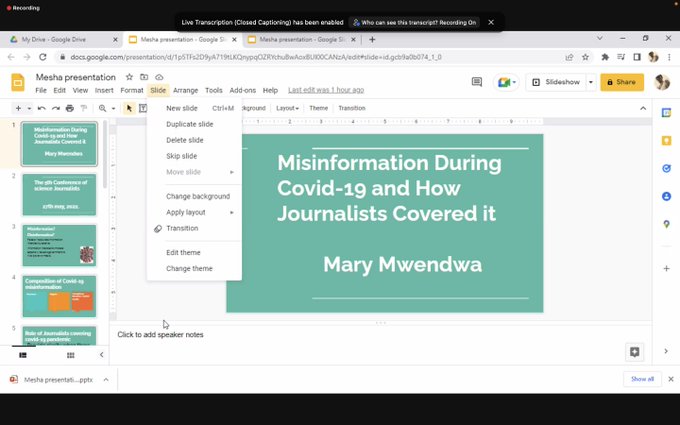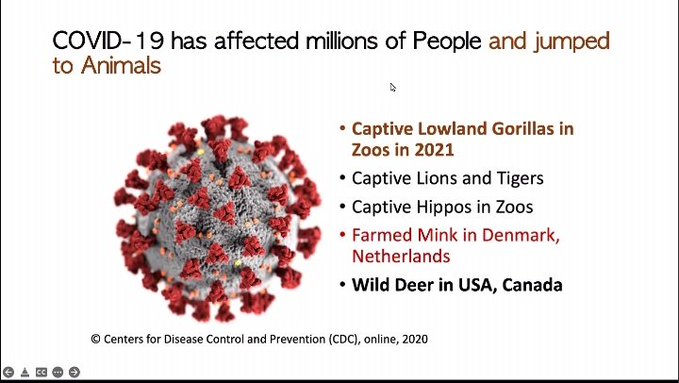By Mike Mwaniki and Christine Ochongo
Nairobi, Kenya: Science journalists have been urged to adhere to journalistic tenets by filing factual and objective stories devoid of personal opinions.
Speaking during the virtual Fifth African Conference of Science Journalists, MESHA editor Godfrey Ombogo urged journalists to also avoid single-sourcing their stories.
“As a science journalist, there is a need to ensure your stories contain quotes from several sources instead of single-sourcing as the latter is regarded as dangerous journalism,” he said.
“As editors, we always have issues with single-sourced stories. There are a number of sources a journalist can refer to enrich their stories.”
The editor urged science journalists to rely more on experts and ensure they cross-check all information, particularly from politicians and government officials who have a tendency of making “outrageous allegations without any backing”.
Mr. Ombogo said science journalists must always quote recognized and approved sources, including the World Health Organisation (WHO), Ministry of Health (MoH), Sustainable Development Goals (SDGs), data reports, science journals, and experts well known in the field of the subject.
His sentiments were echoed by Christophe Hitayezu, a senior journalist from Rwanda, who said factual information helps the public to know what they believe in.
“Facts separate rumors from what is right for public consumption,” said Mr. Hitayezu.
Another renowned journalist from Uganda, Julius Odeke, discouraged science writers from taking scientific statements from leaders and politicians without verifying the facts.
“Our leaders and opinion shapers are useful in giving us lead to stories but we should not take their words at face value. However, this does not mean that they always lie,” said Mr. Odeke.
Earlier, MESHA Secretary Daniel Aghan urged science journalists to “humanize” their stories as much as possible as this makes them more interesting to read or listen to.
“As journalists, we also need to politicize our stories while ensuring we prioritize them due to their proximity as well as linking them to Sustainable Development Goals,’’ said Mr. Aghan.
In September 2015, the United Nations adopted the 2030 Agenda for Sustainable Development which includes 17 SDGs.
Building on the principle of “leaving no one behind”, the new Agenda emphasizes a holistic approach to achieving sustainable development for all.
Mr. Aghan said since the formation of MESHA 16 years ago in Nairobi, the organization had made great strides in enhancing collaboration among science journalists in Africa and other countries.
“In Kenya, for example, the organization has been at the forefront in enhancing mentorship programs among science journalists as well holding regular science cafes, boot camps, training as well as conferences and publication of the monthly Sayansi magazine, among others,” he said.
However, for science journalism to thrive, Mr. Aghan added, there was a need to have the requisite resources and organization among the members.
“As Africans, we need to speak and support each other as we cooperate and mentor others. It’s a fallacy for some people to claim that science stories do not sell,” he said.
Talk Africa Editor Mary Mwendwa recalled the challenges journalists faced when the first case of COVID-19 was reported in Kenya.

“Some of the challenges included pressure to deliver timely and accurate information, unavailability of some experts, and the fact the Health Ministry was the only source of COVID-19 data in Kenya,” said Ms. Mwendwa.
However, following the onset of the COVID-19 pandemic, some of the lessons we learned as science journalists were that fact-checking is critical in storytelling.
“The pandemic exposed weaknesses in healthcare systems while newsrooms’ preparedness in handling infectious disease outbreaks (protection gear and bio-hazard plans) was lacking in most media houses.
“We also realized that there is a need to establish active science desks in newsrooms as well as more training to enable journalists to debunk misinformation which was rife, especially in the social media,” she said.
mikemwaniki2016@gmail.com, christawine@gmail.com
MESHA Features














